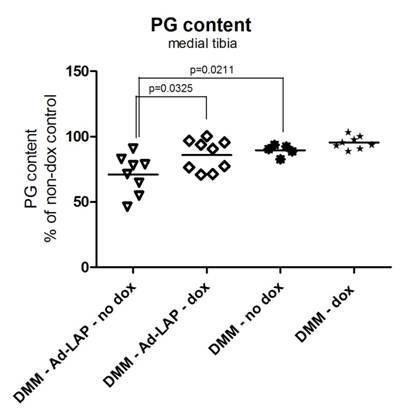Session Information
Session Type: Abstract Submissions (ACR)
Background/Purpose:
We have demonstrated that TGF-beta signaling via Smad2/3 is drastically reduced in articular cartilage (AC) with age and loss of Smad2/3-signaling predisposed AC for OA. We additionally showed that TGF-beta inhibition reduces the proteoglycan (PG) content in AC. During OA BMP2 is elevated in chondrocytes surrounding AC lesions. However, the effect of this BMP2 on AC is unclear. Therefore, we investigated whether elevated BMP-2 could counteract the loss of TGF-beta signaling during OA.
Methods:
We made a unique transgenic mouse expressing human BMP2 under control of the Col2a1 promoter only when exposed to doxycycline (Col2a1-rtTA-BMP2). Functionality was tested on mRNA from AC, spleen and liver 72 hours after exposure to doxycycline- or standard diet (hBMP2 expression). We induced OA (DMM-model) while treating them with doxycycline- versus standard diet. To study the effect of losing TGF-beta activity, we intra-articularly injected an adenovirus overexpressing TGF-beta-inhibitor LAP (Ad-LAP). Four weeks after DMM induction knee joints were isolated for histology. OA was scored based on cartilage damage (adapted OARSI score, 0-30) and PG-content was measured with digital image analysis of Safranin O stainingin AC of the medial tibia .
Results:
Doxycycline treatment clearly elevated hBMP2 mRNA in AC, but not in spleen and liver thereby confirming functionality of the transgenic mice. Doxycycline exposure in Col2a1-rtTA-BMP2 up to 8 weeks did not result in alterations in healthy AC. DMM induced a clear increase in OA-score (average of all DMM groups of 16.9 versus 2.5 in non-DMM), but this was not affected by elevated chondrocyte-specific BMP2. TGF-beta inhibition with LAP did not affect the OA-score either. However, TGF-beta inhibition during DMM significantly reduced the PG-content compared to DMM alone (18%). BMP2 did not affect the PG-content during DMM (figure). Nevertheless, the PG-depletion by inhibition of TGF-beta during DMM could significantly and nearly completely be counteracted by elevated chondrocyte-specific BMP2.
Conclusion:
Our data show that in healthy AC and AC affected by OA in young animals BMP2 did not have detectible effects. However, when TGF-beta signaling was lost, a phenomenon occurring in aged individuals, this resulted in decreased levels of PG-content in AC during OA. In this setting, BMP2 compensated this PG loss. Therefore the elevated levels of BMP2 near OA lesions could be a reparative response of the AC, compensating age-related loss of TGF-beta signaling.
Disclosure:
E. Blaney Davidson,
None;
A. van Caam,
None;
A. Blom,
None;
E. Vitters,
None;
M. Bennink,
None;
W. van den Berg,
None;
F. van de Loo,
None;
P. van der Kraan,
None.
« Back to 2014 ACR/ARHP Annual Meeting
ACR Meeting Abstracts - https://acrabstracts.org/abstract/elevated-levels-of-bmp2-compensate-for-loss-of-tgf-beta-in-articular-cartilage-during-experimental-osteoarthritis/

